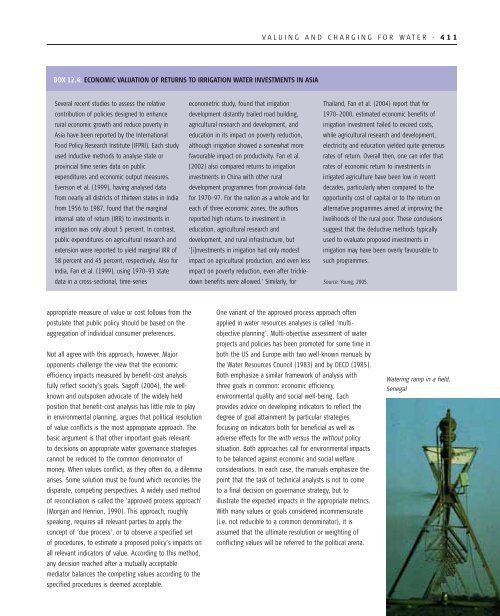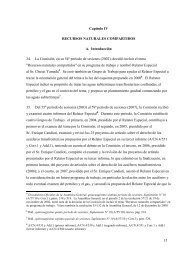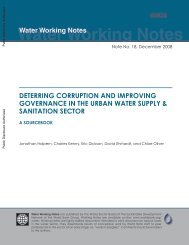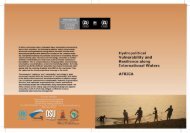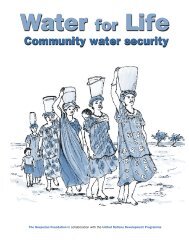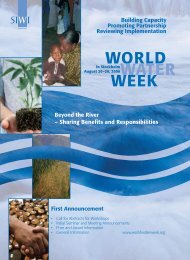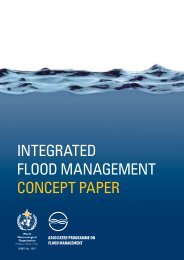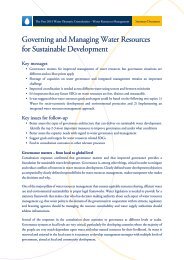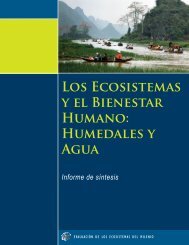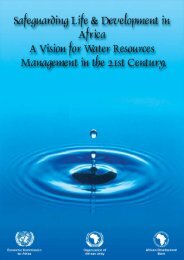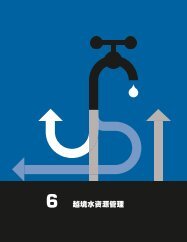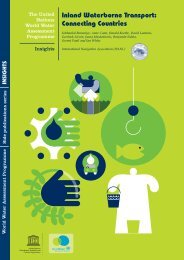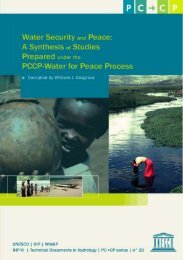Water: a shared responsibility; 2006 - UN-Water
Water: a shared responsibility; 2006 - UN-Water
Water: a shared responsibility; 2006 - UN-Water
You also want an ePaper? Increase the reach of your titles
YUMPU automatically turns print PDFs into web optimized ePapers that Google loves.
V A L U I N G A N D C H A R G I N G F O R W A T E R . 411<br />
BOX 12.4: ECONOMIC VALUATION OF RETURNS TO IRRIGATION WATER INVESTMENTS IN ASIA<br />
Several recent studies to assess the relative<br />
contribution of policies designed to enhance<br />
rural economic growth and reduce poverty in<br />
Asia have been reported by the International<br />
Food Policy Research Institute (IFPRI). Each study<br />
used inductive methods to analyse state or<br />
provincial time series data on public<br />
expenditures and economic output measures.<br />
Evenson et al. (1999), having analysed data<br />
from nearly all districts of thirteen states in India<br />
from 1956 to 1987, found that the marginal<br />
internal rate of return (IRR) to investments in<br />
irrigation was only about 5 percent. In contrast,<br />
public expenditures on agricultural research and<br />
extension were reported to yield marginal IRR of<br />
58 percent and 45 percent, respectively. Also for<br />
India, Fan et al. (1999), using 1970–93 state<br />
data in a cross-sectional, time-series<br />
econometric study, found that irrigation<br />
development distantly trailed road building,<br />
agricultural research and development, and<br />
education in its impact on poverty reduction,<br />
although irrigation showed a somewhat more<br />
favourable impact on productivity. Fan et al.<br />
(2002) also compared returns to irrigation<br />
investments in China with other rural<br />
development programmes from provincial data<br />
for 1970–97. For the nation as a whole and for<br />
each of three economic zones, the authors<br />
reported high returns to investment in<br />
education, agricultural research and<br />
development, and rural infrastructure, but<br />
‘[i]nvestments in irrigation had only modest<br />
impact on agricultural production, and even less<br />
impact on poverty reduction, even after trickledown<br />
benefits were allowed.’ Similarly, for<br />
Thailand, Fan et al. (2004) report that for<br />
1970–2000, estimated economic benefits of<br />
irrigation investment failed to exceed costs,<br />
while agricultural research and development,<br />
electricity and education yielded quite generous<br />
rates of return. Overall then, one can infer that<br />
rates of economic return to investments in<br />
irrigated agriculture have been low in recent<br />
decades, particularly when compared to the<br />
opportunity cost of capital or to the return on<br />
alternative programmes aimed at improving the<br />
livelihoods of the rural poor. These conclusions<br />
suggest that the deductive methods typically<br />
used to evaluate proposed investments in<br />
irrigation may have been overly favourable to<br />
such programmes.<br />
Source: Young, 2005.<br />
appropriate measure of value or cost follows from the<br />
postulate that public policy should be based on the<br />
aggregation of individual consumer preferences.<br />
Not all agree with this approach, however. Major<br />
opponents challenge the view that the economic<br />
efficiency impacts measured by benefit-cost analysis<br />
fully reflect society’s goals. Sagoff (2004), the wellknown<br />
and outspoken advocate of the widely held<br />
position that benefit-cost analysis has little role to play<br />
in environmental planning, argues that political resolution<br />
of value conflicts is the most appropriate approach. The<br />
basic argument is that other important goals relevant<br />
to decisions on appropriate water governance strategies<br />
cannot be reduced to the common denominator of<br />
money. When values conflict, as they often do, a dilemma<br />
arises. Some solution must be found which reconciles the<br />
disparate, competing perspectives. A widely used method<br />
of reconciliation is called the ‘approved process approach’<br />
(Morgan and Henrion, 1990). This approach, roughly<br />
speaking, requires all relevant parties to apply the<br />
concept of ‘due process’, or to observe a specified set<br />
of procedures, to estimate a proposed policy’s impacts on<br />
all relevant indicators of value. According to this method,<br />
any decision reached after a mutually acceptable<br />
mediator balances the competing values according to the<br />
specified procedures is deemed acceptable.<br />
One variant of the approved process approach often<br />
applied in water resources analyses is called ‘multiobjective<br />
planning’. Multi-objective assessment of water<br />
projects and policies has been promoted for some time in<br />
both the US and Europe with two well-known manuals by<br />
the <strong>Water</strong> Resources Council (1983) and by OECD (1985).<br />
Both emphasize a similar framework of analysis with<br />
three goals in common: economic efficiency,<br />
environmental quality and social well-being. Each<br />
provides advice on developing indicators to reflect the<br />
degree of goal attainment by particular strategies<br />
focusing on indicators both for beneficial as well as<br />
adverse effects for the with versus the without policy<br />
situation. Both approaches call for environmental impacts<br />
to be balanced against economic and social welfare<br />
considerations. In each case, the manuals emphasize the<br />
point that the task of technical analysts is not to come<br />
to a final decision on governance strategy, but to<br />
illustrate the expected impacts in the appropriate metrics.<br />
With many values or goals considered incommensurate<br />
(i.e. not reducible to a common denominator), it is<br />
assumed that the ultimate resolution or weighting of<br />
conflicting values will be referred to the political arena.<br />
<strong>Water</strong>ing ramp in a field,<br />
Senegal


